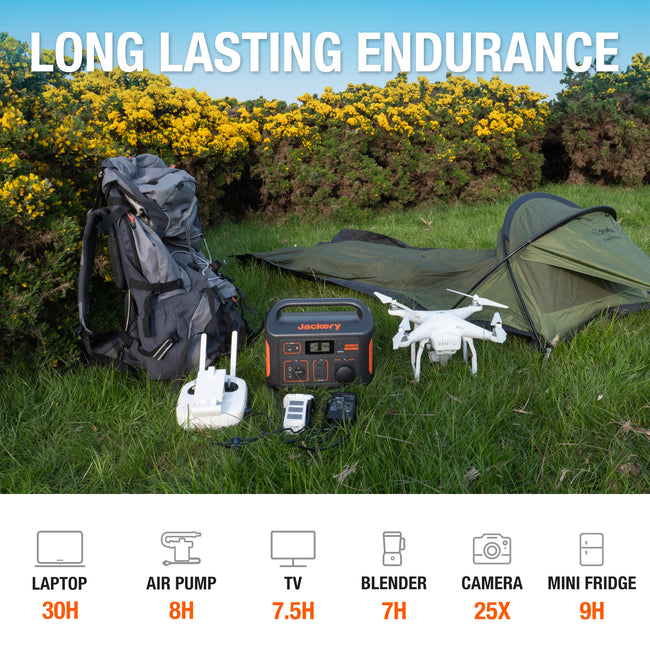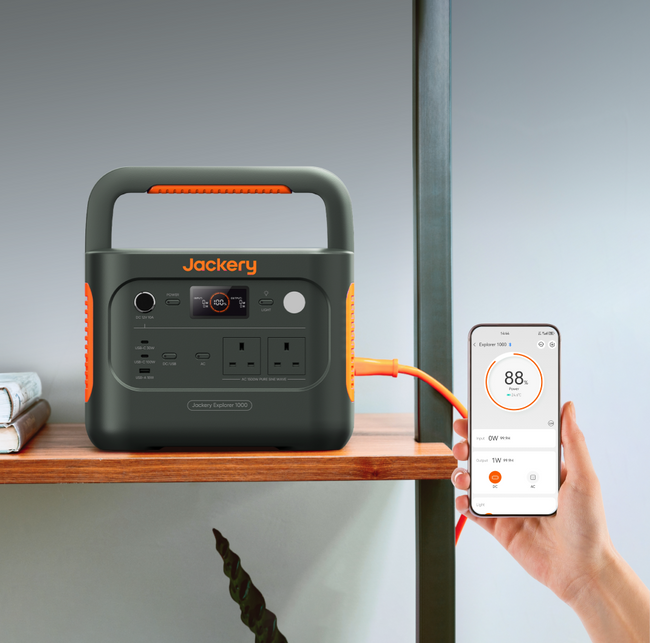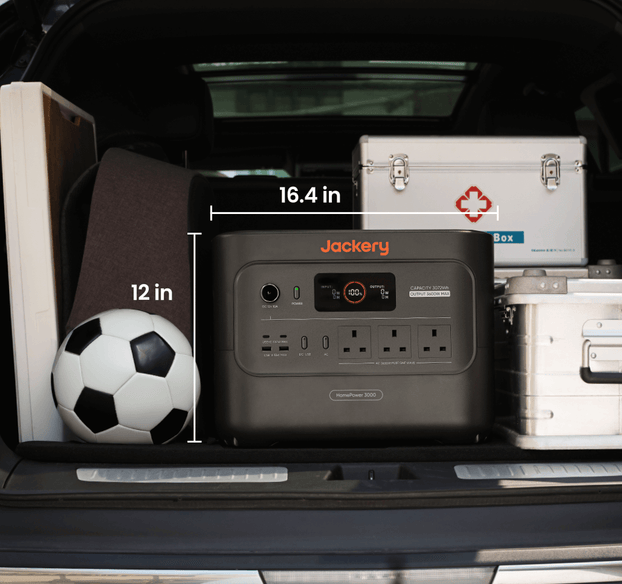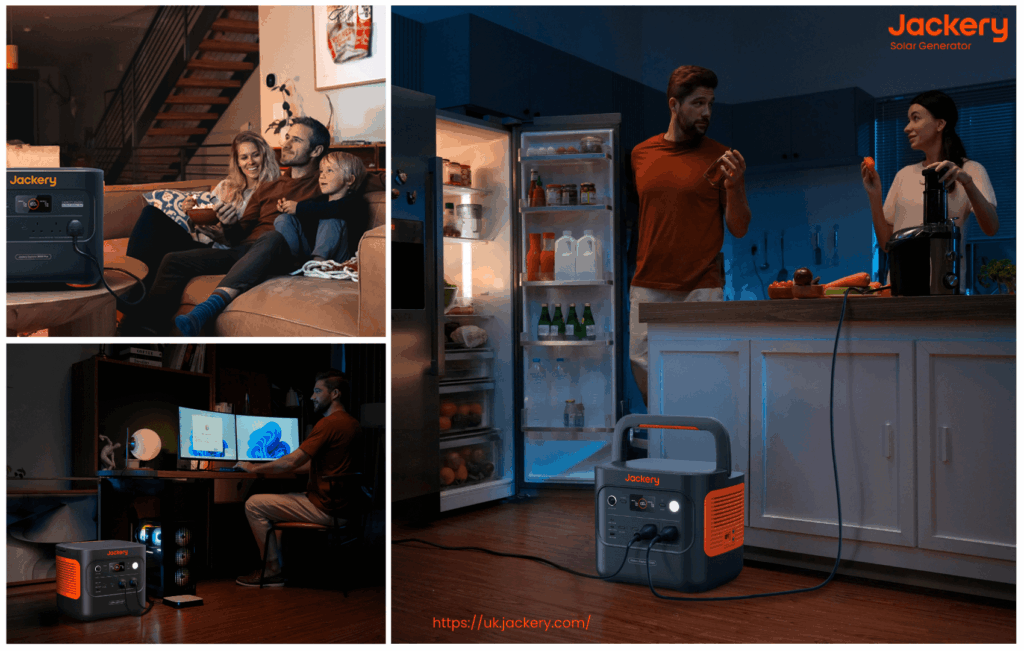Imagine this: You’re winter camping in the Cairngorms, and your portable heater cuts out because your generator’s power is too low—leaving you shivering through the night. This is the top mistake shoppers make: overlooking how power output aligns with the unique rhythms of life when choosing a solar powered generator—from rainy Lake District hikes to cramped London flat emergencies.
The UK’s mix of over 150 rainy days a year, beloved lightweight camping cultures, space-constrained urban housing, and winter power outage risks (especially in rural areas like Cornwall or the Scottish Borders) demands a tailored approach to solar powered generator shopping. Too small, and it fails when you need it most; too large, and you’re wasting money on bulk and unused capacity.
In this guide, we’ll break down power ranges from 100W to 3000W, match them to real UK lifestyles (think allotment afternoons, family camping in the Peak District, and extended winter outages), and show how Jackery’s UK-tested range fits perfectly.
Table of Contents
- What You’ll Learn
- Basics for Beginners: Key Terms to Avoid Mistakes
- Power Range Breakdown: Which Option Fits Your UK Life?
- UK-Specific Tips: Local Factors to Factor In
- Jackery Power Matrix: Match Scenario to Product
- FAQ: UK Shoppers’ Most Common Questions
- Conclusion & Call to Action
What You’ll Learn
- Plain-English explanations of rated and peak power (no technical jargon—we promise!)
- A quick reference chart for how much power common UK appliances use, from camping coffee makers to allotment trimmers
- Which 100W–500W/600W–1500W/1600W–3000W range suits your needs (whether you’re a hiker, homeowner, or campervan enthusiast)
- How to adjust your choice for UK weather, housing sizes, and seasonal demands (hello, winter heating!)
- Jackery’s top picks: from portable electric generator to heavy-duty solar powered generator kits
- Answers to burning questions like “Why choose a LiFePO4 battery?” and “How do tools like a power outage perth map help?”
Basics for Beginners: Key Terms to Avoid Mistakes
You don’t need an engineering degree to pick the right power solution—just master these two terms to avoid buying something that’s either overkill or useless:
Rated Power: The Generator’s “Steady Work Rate”
Rated power is the amount of electricity a generator can produce consistently over time—think of it as how much weight you can carry for a mile without stopping. A 1000W rated model, for example, can run a 1000W electric kettle all morning while you prep for a camping trip, or power a small electric pan for emergency meals during an outage. If your appliance’s power exceeds this number, the generator will shut down immediately—no warning, no exceptions.
Peak Power: The Generator’s “Burst of Strength”
Appliances with motors (like fridges, garden trimmers, or projectors) need a sudden “kick” to start. Their “peak power” (the surge needed to turn on) is often twice their regular running power. A 150W mini fridge, for instance, might only use 150W to keep food cold but needs 300W to fire up its compressor. Peak power is your generator’s ability to handle this surge—if it’s too low, your fridge or trimmer simply won’t switch on, leaving you frustrated.
Quick Rule of Thumb
“For steady-use items (kettles, phone chargers, LED lights), check rated power. For motorized items (fridges, power tools, projectors), check peak power.”
The Role of Battery Type: Why LiFePO4 Battery Matters
While power output gets the spotlight, the battery makes or breaks a generator’s lifespan—especially in the UK’s damp, variable climate. A LiFePO4 battery (lithium iron phosphate) like those in Jackery’s range is far more reliable than traditional lead-acid or standard lithium-ion options: it resists swelling in damp flats, lasts 5+ years (4000+ charge cycles), and works in freezing Scottish winters—critical for a country with such unpredictable conditions.

UK Appliance Power Reference Chart
We’ve tailored this chart to UK lifestyles—no random gadgets, just the gear you actually use:
| Appliance Type | Power Range (W) | Common UK Uses |
|---|---|---|
| Phone/Camera/Action Camera | 10–60 | Lake District hikes, Tay Valley fishing, coastal photography |
| Garden Electric Trimmer | 200–400 | Allotment pruning, small backyard hedges |
| Small Coffee Maker/Electric Pan | 600–1200 | Camping breakfasts, outage-era scrambled eggs |
| Mini Fridge (≤100L) | 80–150 | Campervan trips, picnic food storage, flat kitchens |
| Desktop Heater | 1200–2000 | Winter camping in the Cairngorms, bedroom emergency heat |
| Projector/Small Bluetooth Speaker | 80–200 | New Forest movie nights, garden birthday parties |
| Router/Home Security Camera | 10–50 | Staying connected during storms, monitoring your home |
| Campervan Water Heater | 800–1200 | Scottish road trips, Cornwall coastal stays |
Power Range Breakdown: Which Option Fits Your UK Life?
Each power range is designed for specific energy needs—here’s how they map to real UK routines, with Jackery’s solutions that feel made for British life:
(a) Low Power (100W–500W): Jackery Explorer 500 Portable Power Station
This portable electric generator is a staple among UK outdoor enthusiasts—we’ve heard from hikers who swear by it for Lake District trips. Designed for on-the-go use, it checks all the boxes for day-trippers and allotment owners:
- Ultra-light design: Weighs just 6kg—light enough to sling over your shoulder or tuck into a hiking backpack’s side pocket. A hiker in Keswick even said it “felt lighter than my water bottle” on a 6-mile trail.
- 3-way charging freedom: Top up with foldable solar panels (great for all-day fishing trips where mains power is nonexistent), mains power at home overnight, or your car’s 12V socket on the drive to the trails.
- Device-friendly ports: USB-A and USB-C fast-charging ports let you power 3+ small devices at once—think phone, camera, and headlamp—without juggling chargers.

(b) Medium Power (600W–1500W): Jackery Explorer 1000 v2 Portable Power Station
Key UK Scenarios
This is the most versatile range for UK households—it balances power and portability, making it a “jack of all trades” for everyday life:
- Home emergencies (1–2 day outages): Keep a mini fridge running (to save meat and dairy from spoiling), a router online (so you can check outage updates from British Gas), a small electric pan (for quick meals like soup or scrambled eggs), and a desktop heater (to stay warm in winter).
- Family camping: Trips to the Peak District or Cornwall with the kids—power a coffee maker for groggy parents, a projector for evening movie nights under the stars, and a portable fridge for snacks and drinks.
What UK Shoppers Want Here
Multiple ports (to power several devices at once), indoor safety (no fumes or noise), and durability (to survive both camping trips and years of storage).

(c) High Power (1600W–3000W): Jackery Explorer 3000 v2 Portable Power Station
This range is for high-energy, long-duration use—critical for anyone who needs to power big appliances or go off-grid for days:
- Extended outages : Winter blizzards in Scotland or Northern England can knock out power for days—this range runs 2000W heaters (to avoid freezing), microwaves (for quick meals), and even small washing machines (so you don’t fall behind on laundry).
- Campervan/RV trips: Scottish road trips or English country roads—power your fridge, oven, hot water heater, and TV without relying on campsite hookups. It’s a game-changer for remote stays in places like the Isle of Skye.
- Outdoor events: Stallholders at Glastonbury, the Edinburgh Fringe, or local village fairs—keep lights on, small ice makers running (for cold drinks), and speakers playing music to attract customers.
What UK Shoppers Want Here
Raw power for big appliances, long battery life (so you don’t charge every few hours), and easy mobility (even for heavy units—no one wants to lift a 20kg generator into a campervan).

UK-Specific Tips: Local Factors to Factor In
To make your generator work for the UK (not against it), adjust your choice for these unique conditions:
Weather: Add “Charging Headroom” for Rainy Days
The UK’s 150+ rainy days a year slow solar charging—weak light means your solar powered generator takes longer to top up. If your appliances total 1000W, pick a 1200W model instead. This “headroom” compensates for slower charging, so you don’t run out of power mid-outage or mid-camp. Jackery’s solar panels use MPPT technology, which boosts low-light efficiency by 20%—so even grey days work better than you’d think.
Housing: Size for Flats vs. Houses
- City flats (London, Manchester, Birmingham): Stick to 1500W or below. Jackery’s 1000W battery generator is roughly the size of a small suitcase (40cm x 30cm x 25cm), so it fits under kitchen cabinets or in a wardrobe. The 1500W version is only slightly bigger—still manageable for tight spaces.
- Country houses (Cornwall, Northumberland, Scottish Borders): Opt for 3000W. You have more storage space (garages, utility rooms), and long outages mean you need to power more appliances (heaters, washing machines, freezers). A solar powered generator kit here is worth the investment.
Outage Prep: Use Tracking Tools (Including Power Outage Perth Map)
While you won’t use a power outage perth map for UK outages, it’s a useful example of how outage tracking works. For the UK, use your energy supplier’s app (e.g., British Gas, EDF) or the National Grid’s outage map—they alert you to blackouts in advance, so you can fire up your generator before the lights go out. Pair this with a backup power supply for critical devices like computers, and you’ll never be caught off guard.
Jackery Power Matrix: Match Scenario to Product
Every Jackery model is tested to meet UK standards (CE, RoHS) and fit British lifestyles—use this chart to find your match in seconds:
| Power Range | Key UK Scenarios | UK Shopper Benefits |
|---|---|---|
| 100W–500W | Hikes, allotments, short outages | One-hand carry, 3-way charging, fits in backpacks; charges a phone 20x |
| 600W–1500W | Home emergencies, family camping | Multi-port, LiFePO4 battery safety, runs a mini fridge for 12hrs |
| 1600W–3000W | Campervans, long outages, events | Solar fast-charge (4–6hrs), wheels, powers heaters/ovens for hours |
| All Ranges | Safety-focused users | 4000+ charge cycles, low self-discharge, cold-resistant (-20°C) |
| Emergency Use | Home/office uninterrupted power | Instant switchover (no data loss), protects computers/cameras, compact |
Jackery’s UK Advantage
- Plug-and-play simplicity: All models work with UK 230V sockets—no adapters, no rewiring.
- Local support: UK-based customer service responds within 24 hours, and most orders ship from UK warehouses (next-day delivery to London, Manchester, and Edinburgh).
- Weather-ready: Solar panels are optimized for UK overcast skies, and LiFePO4 battery models work in temperatures as low as -20°C—perfect for Scottish winters.
If you’re also considering traditional backup options, you can find a reliable diesel generator for sale to complement your solar setup during extended outages.
FAQ: UK Shoppers’ Most Common Questions
Q: Will a solar powered generator UK model work in rain?
A: Yes! Jackery models charge via mains or car indoors on rainy days, so you don’t have to rely on solar. The solar panels are water-resistant (not waterproof—keep them under an awning), and the power station itself is safe to use in damp conditions.
Q: Why is a LiFePO4 battery better for the UK than other batteries?
A: It’s built for British homes: ① Safety—UK dampness means traditional lithium-ion batteries risk swelling, but LiFePO4 battery models don’t. ② Durability—they last 5+ years, so you won’t replace them every 12 months. ③ Cold-resistance—they work in freezing temperatures, unlike lead-acid batteries.
Q: Can I use a portable electric generator for my allotment?
A: It’s perfect! Jackery’s 500W model powers small trimmers and water pumps, and you can solar-charge it while you work. An allotment holder in Leeds said it “saved me from dragging a 50ft extension cord across the site—total game-changer.”
Conclusion
Choosing a solar powered generator isn’t about splurging on the biggest model or getting distracted by flashy specs—it’s about finding one that fits your UK life, plain and simple.
The process boils down to common sense, tailored to British challenges: first, list the gear you need to power (whether that’s a trimmer for your allotment, a coffee maker for camping, or a heater for winter outages); next, add 10–20% “headroom” to cover rainy-day charging lags and sudden surges (like a fridge kicking on); finally, pick a size that fits your space—compact enough for a London flat cupboard, robust enough for a Cornish cottage garage.
That’s where Jackery’s range shines. The portable electric generator keeps hikers and allotment enthusiasts powered without weighing them down; the battery generator (or battery power station) acts as a no-fuss lifeline for family homes and rentals; and the high-power solar powered generator kit handles long Scottish blizzards or campervan trips with ease—all built with LiFePO4 battery durability and solar panels optimized for overcast skies. It turns “will my power hold?” into genuine peace of mind.
Shop Jackery’s UK-tailored solar powered generator range today to find your perfect fit for hiking, home backups, or off-grid adventures.

